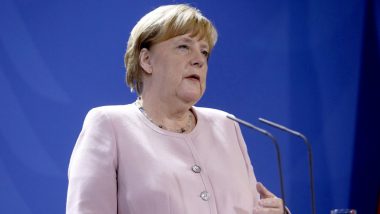Berlin, June 18: The European Union must not be allowed to drift apart economically because of the coronavirus crisis, German Chancellor Angela Merkel said on Thursday, warning that populists and political extremists would pounce on such a development.
A day before leaders of the EU's 27 countries hold a video conference summit, Merkel pledged to push for an agreement “as quickly as possible” on a proposed recovery fund and on the bloc's regular budget for the coming years. Angela Merkel, in Self-Quarantine After Meeting COVID-19+ Doctor, Tests Negative For Coronavirus.
“The starting position is anything but easy, but I hope that all member states will now act in the spirit of compromise in view of this unprecedented situation,” Merkel, whose country takes over the rotating EU presidency for six months on July 1, told the German parliament.
She said she ideally would like an agreement before Europe's summer vacation, but Friday's summit will bring only a “first exchange” and decisions can be made only at an in-person meeting.
The European Union last month proposed a 750 billion-euro ($844 billion) recovery fund to help countries weather a painful recession triggered by the coronavirus - building on a previous proposal by Germany and France.
However, Austria, Denmark, the Netherlands and Sweden - a group of countries dubbed the “Frugal Four” - are reluctant to give money away without strings attached, and their opposition to grants could hold up the project.
“We must not allow the pandemic to lead to the economic prospects of the EU member states drifting apart, weakening the common single market - a core element of Europe," Merkel said. “We will work with determination against the danger of a permanent deep rift in Europe.”
“We must not be naive - the anti-democratic forces, the radical, authoritarian movements, are just waiting for economic crises to misuse them politically," she added.
“They are just waiting to stoke social fears and spread insecurity. Working for sustainable development in all regions of Europe is also a political instrument against populists and radicals.”













 Quickly
Quickly





















